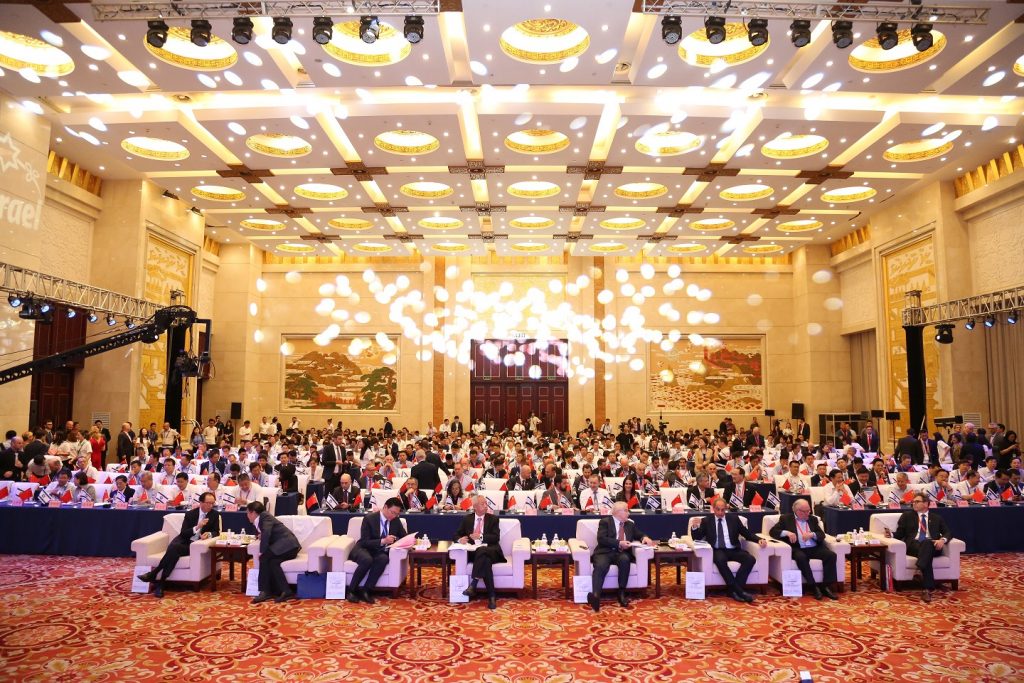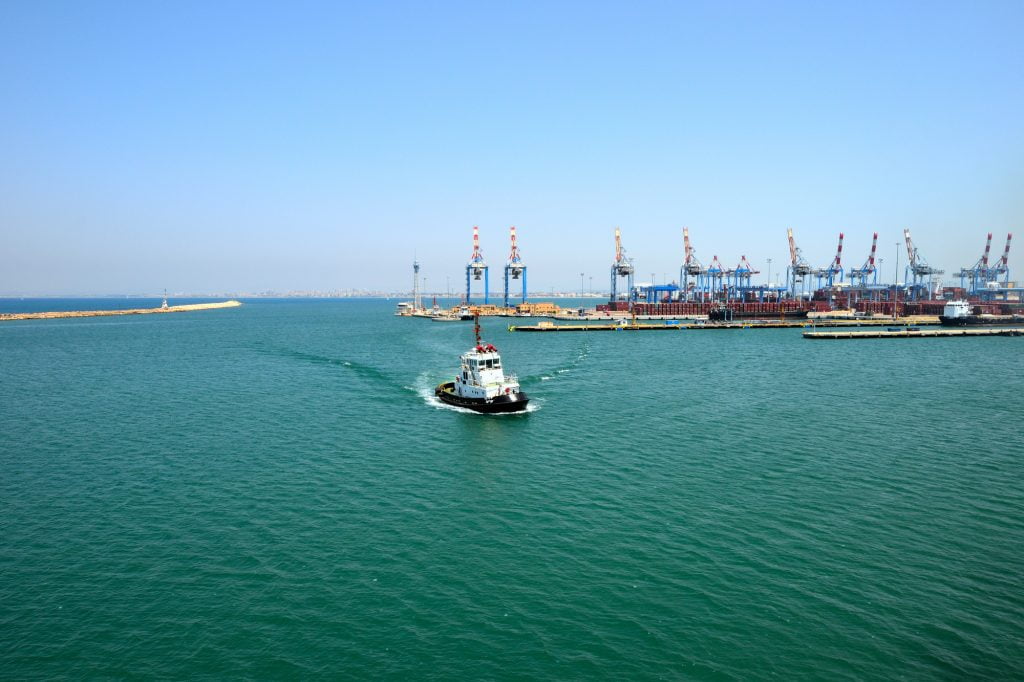Representatives from over 100 Israeli startups and companies were in China this week for an annual conference gathering over 1,000 investors from across the country.
Firms in the fields of biotech, water tech, environmental tech, IT, and energy, among others, headed to the city of Jinan, the capital of the coastal Shandong province, for the annual GoforIsrael conference, organized by the Cukierman & Co Investment House, a leading Israeli investment company, and the Catalyst CEL Fund, a private Israeli equity firm.
Organizers said 108 Israeli companies participated in the event, including pharmaceutical company Raziel Therapeutics, cervical cancer detecting sensor firm MobileODT, green pest control company Biofeed, and 3D printing company Xjet. The latter snagged a Chinese investor, Edouard Cukierman, chairman of Cukierman & Co tells NoCamels. He declined to go into further detail regarding the deal.
SEE ALSO: This Industrial Chinese City Is Looking To Israel To Help Transform Into An Innovation Hub
“We have organized over 700 meetings, many one-on-one, between the companies and the investors, and the feedback has been amazing,” Cukierman says in a phone interview from Jinan.
“It is important for us to keep the quality high, and schedule meetings in advance,” he says, in an effort to maximize the potential. The investors and the companies go through a screening process and the conference is shaped according to areas of interest, he explains.
“There are 45 life sciences companies here, as well as in IT, enterprise software, AI, green tech, and agri-tech,” he says, pointing out that Shandong Guohui Investments, Shandong Province’s investment arm which co-sponsored the event, had a keen interest in water technology.
Last year, the GoForIsrael conference was hosted in Fosun, China, preceded by a similar event for Chinese investors in Tel Aviv.
Chinese investment in Israel
Sino-Israeli business activity has been buzzing over the past decade as China’s interest in the startup nation’s technological know-how has grown, and as Israeli entrepreneurs increasingly eye the huge potential in Chinese markets. But while the interest is high, the numbers reflect a slightly different story so far.
A report published last year by the Israel-based IVC Research Center said Chinese direct investment, mergers and acquisitions, and buyout activities in Israel, while on the rise, were “still waiting for lift off.” The study said that despite the hype, Chinese activity in Israel was not yet significant and that while the Chinese market holds great potential for Israeli startups, “this market is extremely complex for Israeli high-tech companies, far more familiar with the US and European markets where they face far fewer cultural and language barriers and more familiar business practices.”
However, “there has been a growing understanding in Israel that China – the world’s second-largest economy – is moving from a manufacturing base to an innovation leader and a technology trendsetter,” says Rebecca Zeffert, the founder and executive director of the Israel-Asia Center.
“Israeli technologies have received growing interest by Chinese investors for some years now,” she tells NoCamels.
At the same time, Chinese-Israel government relations have been strengthening for years. China is Israel’s largest trade partner in Asia and its third largest global trading partner, with mutual trade estimated at $11 billion as of 2016, according to the Israeli Foreign Ministry.
Israel-China relations were poised to deepen further as Beijing undertakes its “Belt And Road Initiative,” an ambitious project unveiled in 2013 by Chinese President Xi Jin-Ping to expand land and sea trade routes across Asia to the Middle East and Europe through massive infrastructure investment. Israel is of strategic importance in the initiative as a stable, advanced economy in the Middle East seeking to boost its trade potential on a global scale.
A number of Chinese companies are already involved in ongoing major transportation and infrastructure projects in Israel. In 2014, Beijing-based firm China Harbor won a tender to build the new port in Ashdod, and in 2015, the Shanghai International Port Group entered an agreement, with commitments of $2 billion, to build and operate a new port in Haifa for the next 25 years. A Chinese government contractor built the Carmel Tunnels in Haifa starting in 2007. And recently, Globes reported that at least five Chinese firms are set to submit bids for building a key section of the Tel Aviv light rail system.
Late in 2018, Prime Minister Benjamin Netanyahu hosted a delegation led by Chinese Vice President Wang Qishan on a four-day visit that included meetings with Israeli government leaders and prominent figures in the tech and innovation industry, as well as the signing of eight key agreements in fields such as science and technology, digital health, and agriculture.

Israeli Prime Minister Benjamin Netanyahu hosts a Chinese delegation headed by VP Wang Qishan in Jerusalem, on Monday October 22, 2018. Photo by Kobi Gideon/GPO
Caught in the middle?
But affairs may be headed for choppy waters as Israel is braced to navigate an escalating trade war between China and the US which American economists say could cost as much as $600 billion by 2021 if it continues apace. There are also mounting US concerns over alleged intellectual property theft, and Chinese surveillance and espionage efforts via business ties. These concerns led Washington last week to take a major shot at Chinese telecoms giant Huawei, which operates an R&D center in Israel where some 400 people are employed.
Sign up for our free weekly newsletter
SubscribeAmerican officials have already expressed concerns with Israeli-Chinese tightening economic ties and have issued warnings over the increasing involvement of Chinese firms in building major infrastructure projects in Israel, Haaretz reported. In a January meeting between US National Security Adviser John Bolton and Netanyahu, the issue of the Haifa port was brought up as it is a regular stopover for US warships in the Mediterranean and Washington is worried China would use its position to gather intel.
A report issued by the Rand corporation earlier this year warned that such involvement may become a security risk for both Israel and the US. The report recommended that the two allies set up a joint monitoring mechanism for Chinese investments and technology in the region.
Talks about such a mechanism to oversee Chinese investment in Israel, and prevent takeovers of large Israeli corporations, have been ongoing for years, not least since 2014 when China’s Bright Food Group Co Ltd bought a controlling share of Israel’s largest food company, Tnuva. A year later, Fosun International nearly bought a majority holding in a major Israeli insurance company, Phoenix Insurance, but the deal fell through (and was reportedly blocked by Israeli officials).
Last week, however, a government team led by National Economic Council Chairman Prof. Avi Simhon and National Security Council chief Meir Ben-Shabbat recommended against the establishment of such a body, according to local reports, a move sure to anger the US.
“As the US-China trade war escalates, Israel is increasingly being caught in the crossfire. This is being manifested by increased pressure by US companies and investors warning of Chinese involvement in Israeli tech which could threaten these companies’ US business strategies,” Zeffert says.
“The US-China trade war and security concerns raised over Chinese investments in Israeli infrastructure and certain tech sectors will certainly drive some Israeli companies in those sectors to hold off from pursuing Chinese investments. They will simply be forced to pick sides,” she added.
Cukierman says that at the moment, “it is very difficult for Chinese investors in the US, and Israel is persona grata.”
“We have to avoid being in the middle, stay out of the trade war, and pursue Israeli interests because it is in our interest to develop Chinese relations,” he tells NoCamels.
“This issue [of the trade war] is above our heads,” Cukierman says, referencing its complexity.
Zvi Shalgo, chairman and owner of the PTL Group, an organization that provides business services and administrative and operational support, also advocates for a measured approach.
“As long as the US places no restrictions on American companies in the Chinese market, Israeli companies have less to be concerned about but they should structure their business to be flexible and independent enough in case such measures would come to play,” he said in a statement earlier this year ahead of the annual gathering of the China Business Club, a forum of Israeli executives whose companies have operations in China.
“Israeli companies deliberating whether to avoid closer relationship with China because of the way the US treats it or enter a binding agreement of joint venture with Chinese companies, are advised to opt for the middle of the road. This approach would let them remain on the fence for the next few years while maintaining managerial independence of their Israeli company in China while choosing focused collaborations that serve their goals,” he added.
SEE ALSO: Chinese, Israeli Business Leaders Urge More High-Tech Cooperation – And Patience
As for a monitoring body that would oversee investments, Zeffert says it’s a good idea across the board.
“Given the growth of the Israeli economy and the rise of its international relevance, the need for such a government body that oversees any foreign investments in Israel’s strategic assets could be seen as long overdue. China should not be singled out in this regard, however,” she notes.
“If Israel wants to continue to be viewed as a reliable destination for Chinese investment, there need to be clear processes that any foreign investor in sensitive or strategic assets would undergo,” Zeffert explains.
Related posts

Editors’ & Readers’ Choice: 10 Favorite NoCamels Articles

Forward Facing: What Does The Future Hold For Israeli High-Tech?

Impact Innovation: Israeli Startups That Could Shape Our Future







Facebook comments